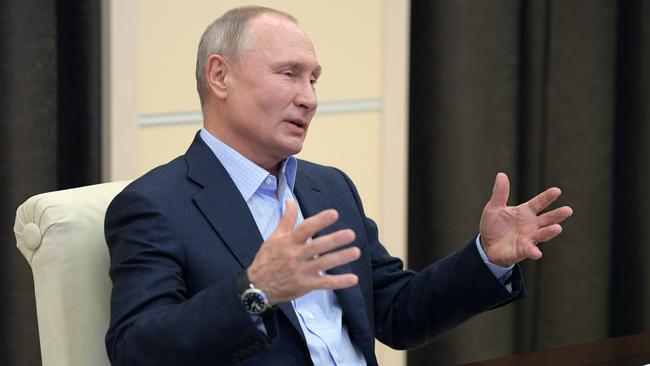Putin faces crisis as plan to extend rule hangs in the balance
The Russian President is facing one of the biggest crises of his rule after the postponements of a vote on his future and a Red Square parade.

Russian President Vladimir Putin is facing one of the biggest crises of his 20-year rule after the postponements of a vote on his future and a patriotic pageant in Red Square.
This week’s military parade to mark 75 years since the defeat of Nazi Germany was meant to be a triumph for Mr Putin, with foreign dignitaries gasping in awe at the President’s elbow.
But there will be no pomp and no swelling of national pride after the parade was postponed because of the coronavirus, as was a referendum that would have given the 67-year-old the reins of power until 2036.
The delaying of both events, compounded by public resentment over a pallid response to the pandemic and the tumbling price of oil, present Mr Putin with one of the most serious challenges since he was first elected in 2000.
Many Russians are angry at the level of government support for businesses under lockdown. Riot police broke up a rally of hundreds of people in the southern city of Vladikavkaz who said they were struggling to feed their families without work. A poll published last week found that 48 per cent of respondents disapproved of how Mr Putin’s government was handling the crisis.
Russia’s bailout measures amount to about 3 per cent of GDP, much lower than other countries. They are largely funnelled to “systemically important” enterprises, leaving small- and medium-sized businesses floundering. Two-thirds of Russians do not have savings and many are struggling.
Mr Putin’s approval rating fell to 63 per cent last month, its lowest level since 2013.
The May 9 parade would have helped shore up domestic support for the Kremlin. However, analysts say that putting off the April 22 constitutional vote was potentially far more damaging than halting the parade of 15,000 soldiers.
Under present rules, Mr Putin must leave the presidency when his term ends in 2024. The amendments include one that would let him stand for another two six-year terms. The Kremlin could have pushed through the changes but, rattled by public censure over pension reforms in 2018, strategists urged Mr Putin to promise a nationwide vote.
“Before, Mr Putin regarded the nationwide vote as being a plebiscite on him. The difficulty now is that it is going to turn into a plebiscite on his handling of the pandemic,” said Ben Noble of University College London.
That is a tricky prospect as the low oil price, a weak rouble and sanctions drag down the economy, with a 5 to 10 per cent shrinkage in GDP predicted this year.
Dr Noble added Mr Putin was reluctant to announce a big virus bailout because he wanted to keep a “war chest” to finance his next bid for the presidency in 2024, or else fund a transition to his liking.
“It is a risky strategy … it could be Mr Putin doesn’t appreciate the shorter-term threat that he could face, especially if public sentiment really turns against him,” Dr Noble said.
One response could be a protest vote against the amendments at a rescheduled plebiscite. Choosing the date for that ballot will be a key task for Kremlin strategists. Too early and it could be influenced by the COVID-19 response; too late and it would cramp the preparations for parliamentary elections next year.
Nevertheless, the vote has a good chance of receiving public approval. The Kremlin has linked the constitutional changes with social guarantees such as adjusting pensions and benefits to inflation.
Tatiana Stanovaya, of the Carnegie Moscow Centre think tank, believes Mr Putin is facing the biggest crisis of his two decades in power and that discontent is already tangible and could speed up an “erosion of Mr Putin’s regime”.
“Mr Putin in some way has become blind,” she said. “He doesn’t see the real picture of social discontent … he has his own agenda of geopolitics, national interests, stability. Ordinary people have their agenda: living standards, incomes, jobs … and this divide will only widen.”
The Times



To join the conversation, please log in. Don't have an account? Register
Join the conversation, you are commenting as Logout